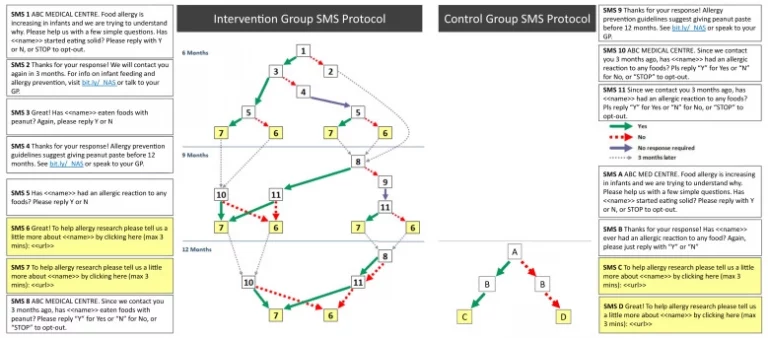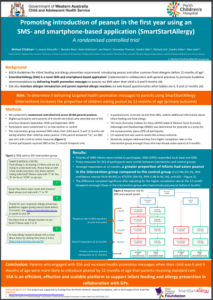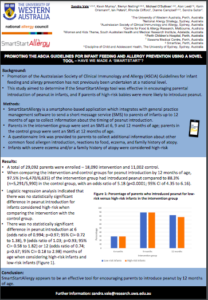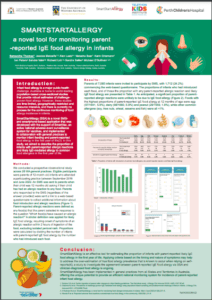LATEST NEWS
Making A SmartStart For Peanut Introduction To Support Food Allergy Prevention Guidelines For Infants
Food allergy affects up to 10% of Australian infants. It was hypothesized that if parents follow the Australasian Society of Clinical Immunology and Allergy guidelines, Australian food allergy rates may stabilize or decline.
This project aimed to determine whether SmartStartAllergy influenced parental introduction of peanut by age 12 months, including in high-risk infants.
Results found that SmartStartAllergy appears to be an effective tool for encouraging parental introduction of peanut.
27 March 2023 – Journal of Allergy and Clinical Immunology. 2 (2), 100102, AUGUST 2023.
Promoting introduction of peanut in the first year using an SMS and smart-based application - SmartStartAllergy
ASCIA Guidelines for infant feeding and allergy prevention recommend introducing peanut and other food allergens before 12 months of age.
Parents who engaged with SmartStartAllergy and received health promotion messages when their child was 6 months and 9 months of age were more likely to introduce peanut by 12 months of age than parents receiving standard care.
Presented by Michael O’Sullivan at the ASCIA Conference 2022; 30th August to 2nd September
Promoting the ASCIA Guidelines for Infant Feeding and Allergy Prevention Using a Novel Tool - Have We Made a SmartStart?
Promotion of the ASCIA Guidelines for infant feeding and allergy prevention has not previously been undertaken at a national level.
SmartStartAllergy appears to be an effective tool for encouraging parents to introduce peanut by 12 months of age.
Presented by Sandra Vale at the ASCIA Conference 2022; 30th August to 2nd September
SmartStartAllergy: a novel tool for monitoring parent -reported IgE food allergy in infants
Infant food allergy is a major public health challenge. This study aimed to describe the proportion of infants with parent-reported allergic reactions and likely IgE-mediated allergy to common food allergens in the first year of life.
Presented by Samantha Thomas at the ASCIA Conference 2022; 30th August to 2nd September

MJA Podcasts 2020 Episode 2: SmartStartAllergy, with Sandra Vale, Dr Michael O'Sullivan and Dr Alan Leeb
Dr Alan Leeb, GP and developer of SmartStartAllergy, Sandra Vale, National Allergy Strategy Manager, and Dr Michael O’Sullivan, consultant immunologist at Perth Children’s Hospital, discuss the strong uptake of new infant feeding for allergy prevention guidelines.
12 February 2020 – Medical Journal of Australia (MJA)

SmartStartAllergy: a novel tool for monitoring infant food allergen introduction in infants
Recent research from SmartStartAllergy has found that infant feeding practices in Australia have changed over the past decade, with a large majority of infants are now fed peanut before 12 months of age.
The SmartStartAllergy program allows monitoring of infant feeding practices in primary care, as well as of parent‐reported reactions to food in infants.
10 February 2020 – Medical Journal of Australia (MJA)

9 out of 10 babies exposed to peanuts
Almost nine out of 10 Australian babies have been introduced to peanuts and other food allergens before their first birthdays, a GP-based study shows.
In the research, 86% of 1940 parents replying to the survey (response rate 57%) had adopted updated advice to expose infants early to peanuts and other foods such as dairy and egg.
7 February 2020 – AusDoc.PLUS

GP Tackles Delayed Allergen Intake in Infants
The safe introduction of peanut and other food allergens to infants is being monitored as part of a new nationwide GP project – called SmartStartAllergy – to promote best practice in reducing allergy.
13 November 2019 – AusDoc.PLUS
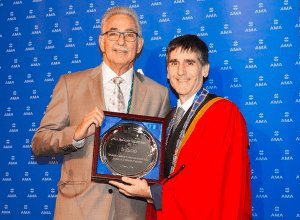
Perth GP Wins AMA Excellence In Healthcare Award
A Perth GP who developed a surveillance program to actively monitor vaccine safety in real time is the recipient of the 2019 AMA Excellence in Healthcare Award. Dr Leeb has once again shown how WA doctors lead Australian medicine in so many ways.
27 May 2019 – Australian Medical Association (AMA) WA

